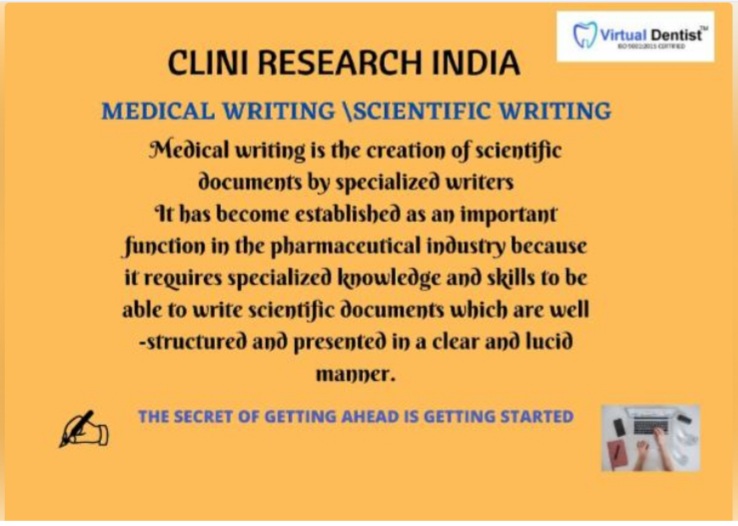MEDICAL WRITING/SCIENTIFIC WRITING
A career as a medical writer can be very lucrative, inter-disciplinary, and both interesting and challenging. Medical writing is the making of scientific documents by expert scientific writers. A medical writer generally closely works with scientists, doctors, and other subject matter specialists to create operative documentation that vibrantly describes research outcomes and product usage. Every year more drugs and medical devices undergo the intricate process of clinical trials and regulatory processes that guide to market approval there is an enlarged request for sound written documents compliant to regulations, standards, and formats. So medical writers use there scientific and research skills to present information in written format to reach the targeted audience. Medical writing created a niche for itself in the Pharmaceutical industry as the industry has comprehended the need for specialist writers who can form well written and well-structured documents, that present the data in a clear, concise manner in compliance with valid regulations. Medical writers not only find a job in the pharmaceutical industry but also can work with health care portals, health care journals, health-related newspapers, as a freelance entrepreneur, and media who can support scientific writing.
Scientific writing requires an ability to understand the information and writing those data in a non-promotional and unbiased form. Scientific writing is scientific and evidence-based in nature.
IMPORTANCE OF MEDICAL WRITING:
• Simplify the complex data clear, credible, concise, and complete manner.
• Documents the different events and procedures related to a medical product.
• Communicates the research information and knowledge according to the target audiences such as the public, scientists, and regulators.
• Required for the analysis and interpretation of the data as per the requirement of the organization.
• Good medical writing speeds up the process of product approval.
SKILLS REQUIRED:
• Attention to detail.
• Scientific accuracy.
• Good communication and coordination with various people involved in the process.
• To use a well-planned search strategy relevant keywords and reliable sources.
• Know the target audience and write at a level appropriate to the target audience.
• Ability to understand the purpose and requirements of the project.
• Sound knowledge of drug development process and regulatory requirements.
• Comprehensive writing skills with good command of English.
• Know basic about MS Excel, MS Word.
ELIGIBILITY:
Life science, MBBS, BDS, BPT, MPT, BSc, MSc, B Pharm, M Pharm, Biostatistics, Bioinformatics, Graduate’s, and Post Graduates.
PROGRAM STRUCTURE:
MODULE 1: INTRODUCTION OF CLINICAL RESEARCH
MODULE 2: INTRODUCTION OF MEDICAL TERMINOLOGIES
MODULE 3: GENERAL INTRODUCTION MEDICAL WRITING AND SCIENTIFIC WRITING
MODULE 4: BASICS OF GOOD MEDICAL WRITING
MODULE 5: OVERVIEW OF THE REGULATORY, MARKETING, AND DRUG PROMOTION PROCESS
MODULE 6: REGULATORY AFFAIRS IN CLINICAL RESEARCH
MODULE 7: ROLES AND RESPONSIBILITIES
MODULE 8: CLINICAL STUDY REPORT
MODULE 9: WRITING FLOW AND COHESIVENESS
MODULE 10: SENTENCE CONTROL
MODULE 11: MANAGING THE REVIEW PROCESS
MODULE 12: PUBLICATION WRITING
MODULE 13: LEARN TYPES OF PAPERS
MODULE 14: UNDERSTAND MANUSCRIPT OF PHARMACEUTICAL JOURNAL’S
MODULE 15: LEARN WRITING SKILLS REQUIRED FOR PHARMACEUTICAL PAPERS FROM SCRATCH
MODULE 16: IMPORTANCE OF PLAGIARISM CHECK-IN PHARMACEUTICAL
MODULE 17: PERSONALITY DEVELOPMENT AND COMMUNICATION SKILLS
MODULE 18: LIVE PROJECTS BY INDUSTRY EXPERT

